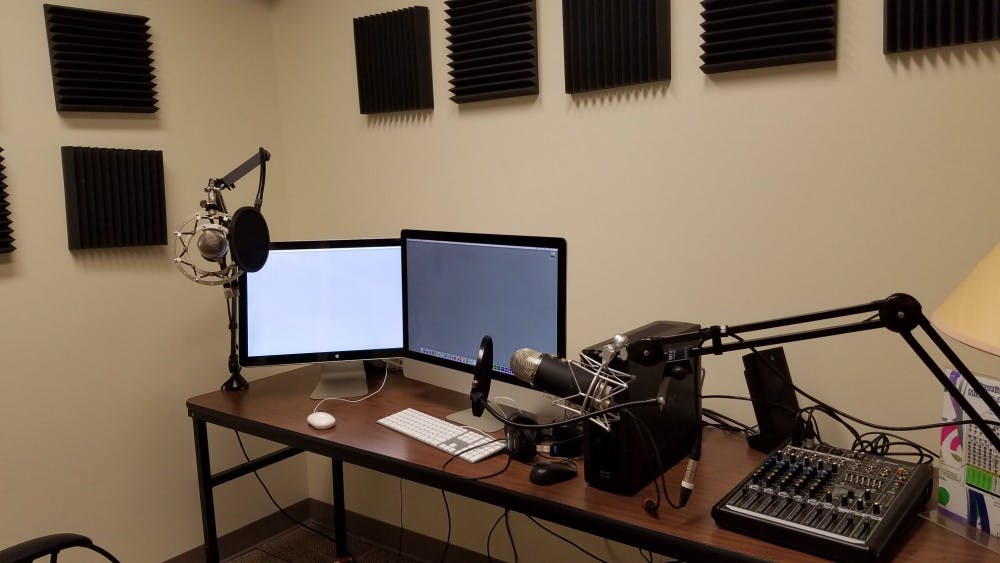A nearly decade-long podcast on campus features some of the professors whose classes you may have taken -- and you might have never heard of it.
Lucretia McCulley, the head of scholarly communications for Boatwright Memorial Library, started Podcasts@Boatwright in the winter of 2009, with the first podcasts premiering on Feb. 11.
“That was when iPods were new and we had several in the library that we were experimenting with," McCulley said. "I thought it would be fun to interview some faculty about their recent publications and see how the iPod worked and try out a new technology, so I started interviewing faculty.
"I just thought I might do this for a year, but then faculty were interested and they kept publishing articles.”
In the 2006-2007 school year, the University of Richmond had experimented with iPods in various departments, including the library and the Global Studio in the Carole Weinstein International Center. The Global Studio gave grants to faculty members to use iPods in various ways, including podcasting.
Podcasting has exploded in popularity in the United States in recent years. According to Forbes, there are now more than 525,000 different podcast shows and more than 18.5 million episodes available in areas ranging from rappers talking about their industry to cooking shows to scholarly work.
“One goal was to test out podcast technology, because that was before podcasts had blown up, so it was kind of a cutting-edge thing to do,” McCulley said. “It was also just a way to promote scholarship on campus.”
McCulley emphasized that, as a librarian, her main goal was to spread the word about faculty scholarship and research.
“Part of my job is maintaining the UR Scholarship Repository, which is a digital archive of faculty publications," McCulley said. "So as I get new publications, I reach out to them and see if they want to have an interview.”
Finding people to interview has not been a problem for McCulley because faculty and staff members have been eager to contribute, she said. They also seem to be a large part of the audience.
“Some faculty have said that they listen while washing dishes or cooking, some have said they listen while running or walking around campus,” McCulley said. “I haven't done a scientific survey about who's listening, but the anecdotal comments have been real helpful.”
The podcast is advertised through SpiderBytes and faculty email lists, as well as on the library website. After SpiderBytes moved from an email format to the UR website, it has become harder to advertise, but it doesn’t pose a problem for McCulley, she said.
Enjoy what you're reading?
Signup for our newsletter
As for the technical side of things, McCulley said she relied on the help of Andy Morton, emerging web technologies librarian.
“I just do the back-end productions stuff," Morton said. "[McCulley] will meet with faculty members, she’ll record it with the recording equipment that the [Technology Learning Center] has on the third floor and then she’ll hand those files off to me. I've been involved since the beginning. She and I worked on it together. She does the biggest bulk, and I do the behind-the-scenes work.”
Morton does all the editing for the podcast and makes sure the quality is top-notch, he said.
“We record up in the TLC and use one of the audio recording rooms," McCulley said. "Those are good rooms with good acoustics and use the software program Audacity, but I always back it up with my iPhone because I don’t want anything to happen and have to ask the faculty member to come back."
McCulley said she made six podcasts per year, with three in the fall semester and three in the spring semester.
“It was really exciting to interview Ed Ayers last winter, the former president here at the University of Richmond,” McCulley said. “He talked about his most recent book, so that was a fun interview to talk about his research over these many years.”
One professor who has been interviewed for his work, assistant professor of education Robert "Bob" Spires, said the experience had been a breeze and very enjoyable.
“I was impressed with sound quality and the ease with which we were able to do the interview,” Spires said. “I highly recommend participating in the podcasts to all of the University of Richmond faculty. A fun and easy way to share your work.”
For the upcoming spring semester, McCulley has a collaboration with University Communications lined up, and they have made some suggestions for faculty interviews.
Contact contributor Mario Hernandez at mario.hernandez@richmond.edu.
Support independent student media
You can make a tax-deductible donation by clicking the button below, which takes you to our secure PayPal account. The page is set up to receive contributions in whatever amount you designate. We look forward to using the money we raise to further our mission of providing honest and accurate information to students, faculty, staff, alumni and others in the general public.
Donate Now



